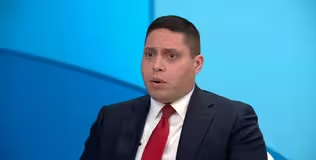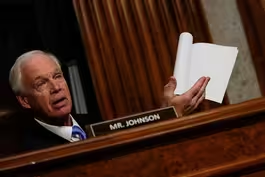
Trump resumes family detention in immigration crackdown
Clip: 4/3/2025 | 7m 2sVideo has Closed Captions
Trump administration resumes family detention in immigration crackdown
One of the most contentious immigration policies in recent decades has been the detention of undocumented immigrant families. The Trump administration plans to detain thousands more in an effort to crack down on border crossings and legal pathways to asylum. John Yang discussed more with Caitlin Dickerson of The Atlantic.
Problems playing video? | Closed Captioning Feedback
Problems playing video? | Closed Captioning Feedback
Major corporate funding for the PBS News Hour is provided by BDO, BNSF, Consumer Cellular, American Cruise Lines, and Raymond James. Funding for the PBS NewsHour Weekend is provided by...

Trump resumes family detention in immigration crackdown
Clip: 4/3/2025 | 7m 2sVideo has Closed Captions
One of the most contentious immigration policies in recent decades has been the detention of undocumented immigrant families. The Trump administration plans to detain thousands more in an effort to crack down on border crossings and legal pathways to asylum. John Yang discussed more with Caitlin Dickerson of The Atlantic.
Problems playing video? | Closed Captioning Feedback
How to Watch PBS News Hour
PBS News Hour is available to stream on pbs.org and the free PBS App, available on iPhone, Apple TV, Android TV, Android smartphones, Amazon Fire TV, Amazon Fire Tablet, Roku, Samsung Smart TV, and Vizio.
Providing Support for PBS.org
Learn Moreabout PBS online sponsorshipAMNA NAWAZ: One of the most contentious immigration policies in recent decades has been the detention of undocumented immigrant families.
Now the Trump administration plans to detain thousands more in an effort to crack down on border crossings, as well as legal pathways to asylum.
John Yang has more -- John.
JOHN YANG: Amna, the Biden administration largely ended the practice of detaining families, but President Trump is bringing it back.
In recent weeks, the Department of Homeland Security has prepared facilities near the southern border to detain families.
Advocates have raised concerns about the living conditions and how long families will be held in detention.
Caitlin Dickerson is a staff writer at "The Atlantic" where she covers immigration policy.
Caitlin, how big a role is family detention going to play in the Trump policy?
CAITLIN DICKERSON, "The Atlantic": I think this expansion of family detention is pretty significant, but certainly it's one of myriad tools that the administration is using to kind of attack, if you will, this issue of immigration from every direction.
So detaining families for a prolonged period of time is something that Trump's border czar, Tom Homan, has indicated he thinks is important to try to end this practice that he calls catch-and-release, where immigrants and immigrant families are allowed to roam freely as their cases are processed.
I want to point out, though, that's not the only goal of expanding family detention, right?
ICE has other tools for that.
They use a cell phone app that they can track people's whereabouts with.
They also use GPS ankle monitors, and that helps to ensure that they can carry out deportations if ordered by a judge.
But I think this expansion of family detention is also part of a publicity campaign that the administration has been very forthright about.
You have had Homeland Security Secretary Kristi Noem and Homan himself talk about trying to convince immigrant families in the United States to self-deport, to leave on their own.
So you're seeing them use memes on the Internet that sort of poke fun at the harsh measures they're taking to crack down on immigration enforcement.
Obviously, Secretary Noem did a press appearance at the mega-prison in El Salvador that the administration has deported several hundred people to.
And I think that the expansion of family detention is really part and parcel here, right?
Their calculation is that more families knowing that they could be detained with their children in the United States might decide to leave the country of their own volition.
JOHN YANG: Family detention, of course, did not begin with the Trump administration.
It went back some years.
Tell us the history of this and what's the reaction has been over the years.
CAITLIN DICKERSON: It's been contentious from the beginning.
Family detention actually started under the George W. Bush administration as an effort to support families who'd recently arrived in the United States and offer them temporary housing, but that didn't last long.
When migration across the southern border started to increase, family detention centers transformed into a tool for deterrence and for helping the administration at the time carry out deportations.
We have had multiple facilities open and then close because of lawsuits.
And toward the end of the Obama administration, which did expand the use of family detention, the administration convened a panel of experts to make recommendations on how to make this system more humane.
And, instead, the experts voted unanimously to have it close down entirely.
They point to this kind of fundamental disconnect between what is effectively a prison and the needs that children have to feel safe and to be safe.
They talk about the harm that being detained does to a developing child's brain, damaging their neurons, even leading to smaller brain masses, these are some of the things that you can read in reports that have been commissioned by the government, because of how scary effectively it is to be in a setting where your primary caretaker as a child has no control.
They can't decide what you eat, where you go, who you speak to, or what happens to you.
And that fear has a really serious impact on these kids.
JOHN YANG: Recently, there's been a lot of focus about two cases of people who are in the country legally.
Mahmoud Khalil, who was part of the protest at Columbia University, was detained and told his green card was being revoked.
And then Kilmar Abrego Garcia, the administration acknowledges they mistakenly deported him to El Salvador, despite having the protection of an immigration judge.
What do these cases tell us about the administration's strategy?
CAITLIN DICKERSON: When you have ICE agents across the country under immense pressure to deport as many people as quickly as possible, I think you may start to see cases like administrative errors that lead to these deportations.
Mr. Abrego's, the Trump administration is now saying is irreversible.
And when you look at the case of Mahmoud Khalil, I think more of the publicity campaign I spoke about earlier.
I think it's relevant and significant that the administration first took away the visa of the most prominent protester as part of this protest movement at Columbia University that the Trump administration opposes, knowing very well that he was someone who was likely to garner a lot of media attention.
The hope is for all of this to have a chilling effect.
And, in fact, that is happening.
I have spent the last several months out in the country reporting on immigrant families specifically.
And just to give you a few snapshots, I can tell you, in Illinois, I heard from administrators of a day care in a community that is heavily dominated by immigrants that their -- people attending school are down really dramatically.
Their attendance is down really dramatically because of fear.
In Upstate New York, advocates have told me about having to go out and buy groceries for immigrant families for weeks or even a month at a time because parents are so scared to leave home or to let their children leave home.
And, in Georgia, I met with families and lawyers representing families who were indeed deciding to leave the country on their own to avoid some of these consequences.
So I think it's almost as if a COVID-type lockdown is happening in different parts of the country where you have lots of immigrant families scared to leave home.
They're holed up, looking at their phones and social media at all times for reports of ICE arrests and really feeling a fear that's so intense they don't want to even fulfill the basic needs that they have.
And I think, from the administration's statements, this is exactly what they're hoping for.
JOHN YANG: Caitlin Dickerson of "The Atlantic," thank you very much.
CAITLIN DICKERSON: Thank you so much.
Conservative lawyer on Trump's use of executive power
Video has Closed Captions
Clip: 4/3/2025 | 8m 25s | Conservative constitutional lawyer weighs in on Trump's aggressive use of executive power (8m 25s)
GOP Sen. Johnson says he supports tariffs but has concerns
Video has Closed Captions
Clip: 4/3/2025 | 7m 59s | GOP Sen. Johnson says Wisconsin bracing to see 'how painful' tariff fallout will be (7m 59s)
Markets plunge in wake of Trump's tariffs, trade war fears
Video has Closed Captions
Clip: 4/3/2025 | 11m | Markets plunge in wake of Trump's new tariffs and fears of global trade war (11m)
Taiwan boosting defenses to resist Chinese aggression
Video has Closed Captions
Clip: 4/3/2025 | 11m | How Taiwan is boosting its defenses to resist Chinese aggression (11m)
Providing Support for PBS.org
Learn Moreabout PBS online sponsorship
- News and Public Affairs

FRONTLINE is investigative journalism that questions, explains and changes our world.

- News and Public Affairs

Amanpour and Company features conversations with leaders and decision makers.












Support for PBS provided by:
Major corporate funding for the PBS News Hour is provided by BDO, BNSF, Consumer Cellular, American Cruise Lines, and Raymond James. Funding for the PBS NewsHour Weekend is provided by...



